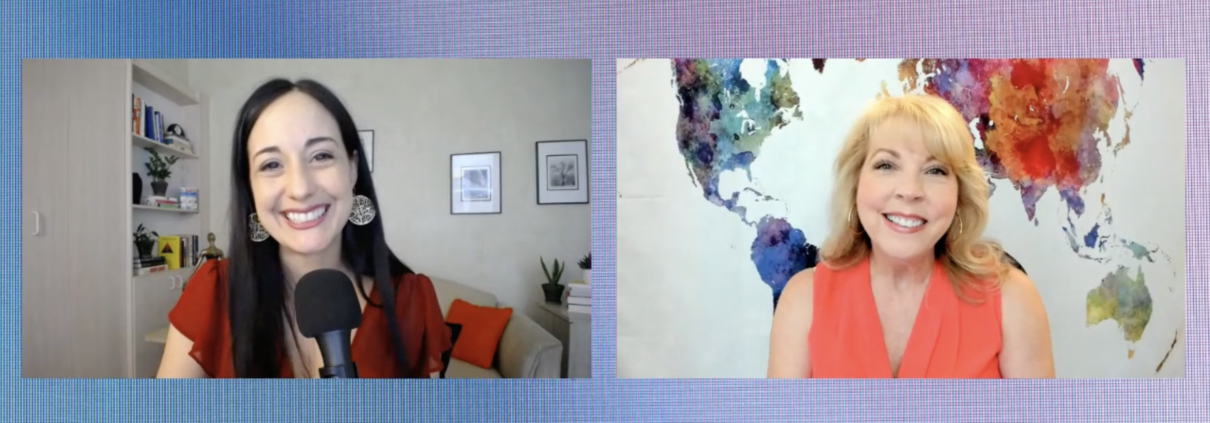Four Ways to Master Post-Pandemic Etiquette
___
BONUS FREEBIE: Your message deserves the media’s attention. So how do you get out there in a bigger way? I’ve got you covered. CLICK HERE to grab my free “Checklist to Become a Go-To Media Expert.”
___
So many of us are getting back to in-person or hybrid work, which is something to celebrate. In fact, I have a whole course on LinkedIn Learning dedicated to the topic. It’s called Enhance Productivity in a Hybrid Work Environment.
But this new phase also introduces some uncertainty when it comes to interacting with coworkers who you likely haven’t seen in person in months.
On top of that, a year and a half of remote contact might leave you wondering how to act in public.
Jacqueline Whitmore, etiquette expert, author, and founder and director of the Protocol School of Palm Beach, joined me on my live-streaming show Inside Scoop to offer her expertise.
1) Skip the handshakes (but don’t be rude).
Jacqueline doesn’t recommend handshakes, because everyone is healthier without that exchange of germs. But you can always elbow bump, fist bump, or put a hand on your heart and nod. She says we are in a transitional period, and things are not the same as they were pre-pandemic.
“We have to think differently and we have to be more mindful,” she says. “What I try to teach people is that etiquette is about being mindful of other people’s feelings. It’s about being mindful of how your behavior affects other people. It’s more than just knives and forks.”
2) Don’t ask about vax status — because there’s a better way to bring it up.
Jacqueline says that however curious you may be, it’s generally not polite to inquire about someone’s vaccination status. Of course, you may feel comfortable asking a close friend or someone you’ve known for a long time. In professional settings, though, it’s best not to outright ask.
Why? Well, Jacqueline says this falls under the umbrella of questions that are impolite to ask about directly — just like you wouldn’t ask a colleague “Why aren’t you married?” or “Are you pregnant?” But Jacqueline says you don’t need to avoid the subject of vaccination altogether.
Instead, Jacqueline suggests sharing your own experience of getting vaccinated. If the other person wants to chime in or ask questions, you’ve provided an opportunity. They may just smile and nod, or they might want to share. You’ve put the ball in their court.
3) Newfound social anxiety? You can still say no.
Many people are experiencing new anxieties around social gatherings — whether it’s because of the risks of the Delta variant or because they just haven’t been around people in a long time.
If you keep finding yourself wanting to decline invitations, Jacqueline says it’s totally fine to politely say no. You don’t need to give any reasons — the other person probably won’t even ask. If they do, Jacqueline suggests saying something such as “I’m still making that slow transition into getting back into the real world. And I’ll get there, but right now I’m not quite there.”
If you feel guilty about saying no, don’t! The pandemic has changed our perspective on what we value. So if you decide that certain social gatherings aren’t adding to your life, listen to yourself. I’m all about the life-changing power of saying no!
4) On camera? Read the “virtual” room.
Though many people are transitioning to hybrid work, video calls are here to stay. Jacqueline says that turning your camera on is best. It’s so much harder to make that connection if you can’t see someone’s face.
The mute button is another must-use — it’s just impolite to have your background noise interrupting the conversation or presentation.
Jacqueline says using headphones or AirPods is the polite thing to do, especially if you work in an industry where privacy is a factor. Even if it isn’t, you want to be sure your conversation isn’t bothering anyone around you — whether that’s your family members or people swimming in the pool while you take a call from a lounge chair.
According to Jacqueline, other Zoom no-no’s are eating, driving, and sleeping on camera. If that’s you, cut it out!
This new world may seem daunting, etiquette-wise. But Jacqueline says it often comes down to reading the people you’re interacting with.
If you’re not sure about the proper way to behave, ask yourself these questions:
- Is your behavior communicating respect?
- Are you trying to ensure your colleagues’ and clients’ comfort and safety?
- Are your habits consistent with your values and professional goals?
If you can say “yes” to those questions, you’re on the right track. And cut yourself some slack — we’re all figuring this out together.
You can check out my full conversation with Jacqueline here.
___
BONUS FREEBIE: Your message deserves the media’s attention. So how do you get out there in a bigger way? I’ve got you covered. CLICK HERE to grab my free “Checklist to Become a Go-To Media Expert.”
___











Leave a Reply
Want to join the discussion?Feel free to contribute!